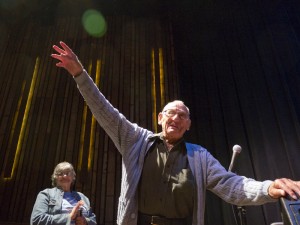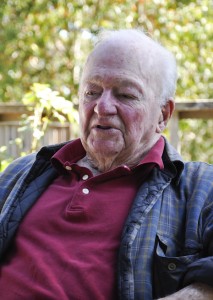California Vets: Del Berg and Jim Benét
Northern California is the fortunate home to two of the remaining Lincoln Brigade veterans: former newspaperman James Benét, now 98, and Delmer Berg, a very lively 96. Two of the four known living Lincolns today, Berg and Benét, each of whom lives a few hours drive from San Francisco, are mentally fit and living independently.
Already a professional journalist in New York City, 23-year-old Stanford graduate Jim Benét arrived in Spain in the spring of 1937 to drive ambulances. Later he volunteered for combat. Before leaving for Europe, he wrote in the New Republic magazine that many in the crowd at a fundraising rally for the Spanish Republic in Madison Square Garden “feel (for they called out during the collection) that the money should be given for arms, instead of supplies.”
Benét arrived in Spain soon after the destruction of the Basque city of Guernica in April 1937 by German incendiary bombers practicing their first “Blitzkrieg.” Cynically, he said, the Spanish fascists announced to the country and the world that “the Reds” had leveled the defenseless town. He saw combat in the battle of Brunete in July 1937 and then again during the first and second attempts to stop Franco’s offensives at Aragon in March and April 1938. Of combat, he recounted, “I saw a young Lincoln’s hair turn white, in the space of one week, completely white—from fear. He was then transferred away from the front.”
“I’m very proud of the fact that my family name is Catalan,” he said in a recent interview. “I’m mostly Irish, but one eighth Spanish—from Catalonia.” After 15 months of duty, Benét left Spain in the fall of 1938 along with the other internationals. “We were tricked by the fascists,” he said of the defeat of Republican Spain the following year. “The fascists had much more technologically advanced weaponry, but the Republican and the international troops had greater numbers and bravery.”
Benét, whose uncle was the famous Stephen Vincent Benét, author of “John Brown’s Body,” resumed his journalistic career with the New York bureau of TASS (the Soviet news agency) during World War II. He later worked for the San Francisco Chronicle for 20 years and for the Pulitzer prize-winning KQED television show Newsroom. For several years he taught at the university level. He now lives alone in a cozy home in rural Sonoma County, assisted by regular housekeepers. He advises young people today to always question and seek truth for themselves, so that “when you get old you won’t feel, ‘I should have known. I should not have believed or accepted [the lies].’”
“Spain made a man of me,” Benét added. “Going to Spain was the right thing to do. You couldn’t have a better beginning in life! We thought then, and I know now, the civil war was a genuine attempt by the Spanish people to defend democracy against the tyrannical and inhuman regimes of Franco, Hitler and Mussolini.”
Del Berg’s roots contrast with Benét’s middle-class upbringing. “I was born into a struggling farm family in Southern California,” said Del in a recent interview in the spacious, stone, hillside home he built himself in the Sierra Nevada foothills of Tuolumne County. A life-long farm laborer and radical organizer, he now cares for his ailing wife, June. Berg had already been in the U.S. National Guard—as well as the Young Communist League—before he took off for Spain in early 1938 at the age of 21.
Based on his military experience, he was assigned to laying communication lines from Republican bases to the battle fronts. Berg’s unit worked first near Barcelona, then in the defense of Teruel, and at the battle of the Ebro River. “We helped blow up the bridge on the Ebro, because it was an important connection to the Mediterranean Sea for the fascists,” he said, smiling.
Next came his fateful assignment to the central coast city of Valencia, where he was largely idle, as lines had already been laid. “We got a liter of wine a day,” he recounted happily, “and I even got to go to the movies a couple of times in Valencia.” But in August 1938, at 10 p.m., Italian airplanes bombed the dormitory of a monastery where the brigadistas billeted, rather than their intended target, the railroad station. “`If you want to be safe,’ we used to say, ‘go to where the fascists want to bomb.’” Berg, who was sitting up in bed, was hit in the side by shrapnel, which still rests in his liver today. But several of the internationals from Italy were killed by the very fascists who had taken over their country. Like Benét, Berg left Spain in October 1938. “I felt bad,” he admits, “because I was not that active in Spain. But you do what you can do.”
Back home, Berg got married, was drafted into the U.S. Army for three years during World War II, and returned to Modesto. He participated in numerous activist movements with various groups, including the United Farm Workers, the local NAACP (he was the only white member), the Mexican American Political Association, the anti-Viet Nam War movement, the Democratic Club, the Congress of California Seniors, peace and justice committees, and many more. Asked if he was ever called by the House Un-American Activities Committee, Berg proudly produces a 1966 letter asking him to “please contact” their office. “They could never find me to serve a summons,” he grins.
His proudest moment since Spain? “When I was elected vice president of the local NAACP,” Berg says, “and when one of my grandsons was valedictorian at his Oregon high school graduation and said in a newspaper interview, ‘My grandfather is my inspiration. He’s a Communist.’”















Please send me Jim Benet’s address. One of his daughters (now deceased) was one of my closest friends.
N
I met Del Berg when we were both volunteers for the California Nuclear Freeze Initiative in the early 1980s. He hired me part time to help with building his house overlooking one of the most beautiful canyons of the Sierra Nevada. He had spent many years building the house out of rocks blasted from the mountainside itself, and he was truly amazing as he lifted, pushed, and pulled the rocks into place and made them into such an impressive home. The last time I saw him was in San Francisco at a march and rally in honor of a fallen Salvadoran human rights activist, and when I asked him what he’d been up to Del replied that he’d just gotten back from a fact finding mission in Namibia. Del is the finest man I have ever had the privilege to have known personally.
Hello, I was wondering if I can get in contact with Del Berg, because I am doing a project in my Spanish class. The project is on the Spanish Civil War, so if you would give me a way to contact him I would appreciate it very much.
Dear Delmer:
Generally speaking, I didn’t like Christmas, but it has changed since I have known that thousands of men from all the world left behind them their families to help my country to fight Fascism.
Yesterday night I was reading the book of an American war correspondent of war while he was covering the campaign of the Ebro. Vincent Sheean was amazed by the courage and resistance of the Lincolns, he was so impressed that he wrote this words:
“……But knowing their story, on paper or by hearsay, was not at all the same thing as seeing them there as they returned from the catastrophe, after three weeks of the most ghastly punishment that overwhelming superiority of aviation and artillery could inflict upon them. They had seen their friends butchered; they had seen in such acute danger that it is a wonder any of them got across the Ebro again; they had been hungry and cold for a long time, and their clothes were in tatters. A certain number of them had been, of course, dispirited by such a succession of calamities, and there was plenty of grumbling to be heard here and there, as well of some evidences of shell shock and demoralization. There had been (or so I heard) some desertions. But most of the ones I saw- and I wandered about among them pretty freely-startled me by their indomitable spirit, their refusal to recognize even implicitly that this defeat might affect the outcome of the war, their easy, cheerful and implacable resolution. I had been in Pennsylvania only a few weeks before, and had visited Valley Forgue on a day of thick white snow when it was easy to imagine what the state of the Continental army must have been in the winter of 1777-78. These boys made me think of Washington’s words inscribed on the national arch at Valley Forgue:
Naked and starving as they are, we cannot enough admire the incomparable patience and fidelity of the soldierly.
Extracted from Not Peace by a Sword, by Vincent Sheean.
[…] At last report, Del is one of only two surviving veterans of the Lincoln Brigade. […]
[…] Photo credit: The Volunteer […]
Dear Del,
I just want to thank you for your valor and generosity in fighting for the people of Spain.
Thank you,
Carlos
[…] of Franco. The Soviet Union aided the Republicans. (The methods were still a little rough, which is one reason the monastery was struck: “‘If you want to be safe,’ we used to say, ‘go to where the fascists want to bomb.’”) […]
[…] of Franco. The Soviet Union aided the Republicans. (The methods were still a little rough, which is one reason the monastery was struck: “‘If you want to be safe,’ we used to say, ‘go to where the fascists want to bomb.’”) […]
I need to research Del Berg. Would someone tell he how to reach his great grandson in Oregon? – George
Beres geosilberes@q.com
[…] of Franco. The Soviet Union aided the Republicans. (The methods were still a little rough, which is one reason the monastery was struck: “‘If you want to be safe,’ we used to say, ‘go to where the fascists want to bomb.’”) […]
[…] Breve retrato de Delmer BergA partir de la revista de ALBA The Volunteer […]